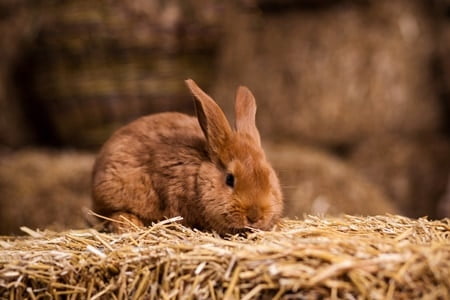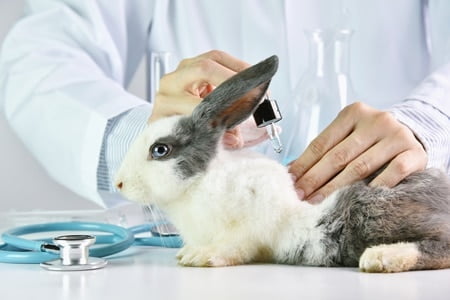Rabbits can be sensitive to certain foods and common environmental allergens. Often owners suspect their rabbit is experiencing an allergic reaction when they have obvious symptoms, such as red and watery eyes, sneezing, and discharge from the nose.
Rabbits can get allergic reactions to food, cleaning products, strong scents, fumes, cigarette smoke, mites, and fleas. Some owners report rabbits having allergies to hay, but in most cases, the main culprit is the dust in the hay. Certain ingredients in pelleted food may cause allergic reactions in rabbits as well.
Allergies in rabbits are poorly understood and rarely diagnosed. It is important that you identify the early signs of your rabbit’s allergic reaction. Prolonged exposure to allergens may lead to severe complications, such as respiratory infections, chronic rhinitis, and bronchitis.
Types of Rabbit Allergies
| Type of Rabbit Allergy | Signs and Symptoms | Causes |
|---|---|---|
| Food allergies | Changes in skin and fur | Food, genetics and environmental factors |
| Dust Allergy | Sneezing, itching and inflamed eyes | Dust from hay |
| Environmental Irritants | Itching and red, watery eyes | Household chemicals, fumes, mites and fleas |
| Bedding Allergy | Itching and red, watery eyes | Soiled bedding |
| Allergic conjunctivitis | Red, watery eyes and discharge | Exposure to above allergens |
Do Rabbits Have Food Allergies?
Food, such as pellets, veggies, fruits and rabbit treats can cause sensitivities in rabbits. The primary symptom of food allergy in rabbits is irritated skin.
You’ll be able to identify skin issues in your rabbit when your rabbit tries to constantly scratch at its skin, causing fur loss.
While identifying what’s causing your rabbit’s food allergy can be a long and daunting process, it can be done with an elimination diet.
What Are the Signs of a Food Allergy?
The first step in diagnosing and treating a food allergy is to identify the symptoms. Common symptoms of food allergies include:
- Itching and scratching
- Constantly licking at the feet
- Scooting the back end to scratch it
- Ear problems
- Hair loss
- Scabbing
- Diarrhea
- An unhealthy, matted coat
It may take several months before you notice fur loss, skin lesions or any changes in your rabbit’s coat.
Symptoms of a food allergy may worsen as your rabbit’s immune system builds a greater response due to continued exposure to the allergen. If your rabbit is sensitive to a certain food, it will show up as changes in its poop.
If your rabbit doesn’t poop as much as normally, has loose stools/diarrhea, refuses to eat, shows signs of pain or bloating, these are obvious signs.
What Are the Causes of a Food Allergy?
In many cases, food allergies are caused by genetics.
Anything in a rabbit’s diet, such as vegetables, fruits, ingredients in pellets and other sources of nutrition can cause a food allergy.
Environmental factors may play a role as well. During the first few weeks of a rabbit’s life, certain environmental factors may make it more likely for the rabbit’s immune system to overreact to some foods. However, some rabbits may be genetically predisposed to experience this overreaction.
A rabbit can be allergic to any ingredient it has consumed in the past.

How to Manage Food Allergies
An elimination diet is the best way to find out what food allergen is causing your rabbit’s food allergy. There is no valid intradermal skin test or blood test to test for food allergies.
Your vet will recommend a new diet that may be completely different from your rabbit’s existing food. You may be asked to feed nothing but the new diet for up to 8 to 10 weeks. This will help your vet to see if the symptoms lessen or disappear after swapping out your rabbit’s old food.
If the elimination diet works, your rabbit will show improvements in its symptoms during the course of the new diet.
Next, the owner will be asked to slowly reintroduce certain foods from the old diet, one ingredient at a time.
Once you’ve reintroduced a single ingredient, you must monitor your rabbit for 1-2 weeks. If symptoms return, this confirms that the food item is one of the culprits for your rabbit’s food allergy.
Irritants and Allergies in Rabbits
A common question by rabbit owners is “does my rabbit have hay fever?” Your rabbit may not have hay fever, but it may be displaying an allergic reaction to items in the cage or your house.
What Are the Symptoms of Irritation?
The most obvious signs of environmental irritation include:
- Red eyes
- Clear discharge from the nose
- Rubbing the face on the ground frequently
- Repeated touching of the face and nose with paws
Common Household Irritants
Household items that are most likely to irritate a rabbit include:
- Air fresheners
- Carpet cleaning products and carpet fresheners
- Strong or artificial scents
- Essential oils
- Dust
- Cigarette smoke
- Fireplace fumes
- Mites and fleas
Treatment Methods
Prolonged exposure to environmental irritants can lead to respiratory infections, chronic rhinitis, and bronchitis in rabbits.
Preventive measures include:
- Using a fan to circulate fresh outside air
- Installing a HEPA filter
- Cleaning your air ducts to remove dust
- Regularly dusting your rabbit’s cage and household items
- Remove the allergen from your home
- Using natural cleaning products, such as vinegar and baking soda
- Switching to a natural floor cleaner
- Using scentless detergents
Your vet may prescribe antihistamines and corticosteroids to manage the inflammation. They will determine if your rabbit has an allergy or infection through a simple blood test as the symptoms for both can be similar.
Can a Rabbit be Allergic to Hay?
At least 80% of a healthy rabbit’s diet should consist of fresh hay. However, when a rabbit sneezes around hay, it’s a cause of concern. However, you don’t have to eliminate hay from your rabbit’s diet to cure its allergies.
Different types of hay have different moisture levels. This affects the amount of dust the hay naturally produces while it is being handled. When your rabbit sneezes around hay, it doesn’t mean it has an allergy to hay.
Sneezing caused by hay can be controlled using the following techniques:
- Fluff the hay gently after removing it from the box and placing it in a storage container to remove excess dust
- Lightly mist the hay before feeding to keep dust levels low
- Try a different type of hay. Oxbow’s Harvest Stacks is a great option because they’re compressed hay stacks that produce less dust. Orchard grass is another excellent alternative to Timothy Hay
Keep in mind that any changes you make may take some time to make a difference to your rabbit’s sneezing.
A vet should also perform oral and nasal examinations. Your rabbit may be sneezing due to an upper airway disease, which is associated with a bacterial infection. This is fairly common in rabbits because they are obligate nose breathers.

Is My Rabbit Allergic to its Bedding?
If a rabbit’s bedding isn’t cleaned or replaced regularly, it may display symptoms of an allergy. Soiled bedding leads to the build-up of ammonia, which can cause irritation in rabbits.
Having uncleaned bedding can also lead to emotional stress in rabbits, further compromising their immune systems.
If you do clean out your rabbit’s bedding frequently, the type of bedding may be the cause. Common offenders include newspaper and wood chip beddings. Change the bedding and see if symptoms improve.
Does My Rabbit Have a Pellet Allergy?
Some rabbits may develop sensitivity to pellets, even if they’ve been consuming them for a long time. A pellet allergy may cause changes in your rabbit’s feces. Your rabbit may be defecating less frequently or producing softer stools.
BMC Veterinary Research stated that rabbits are hind-gut fermenters that rely on the microbes in their gut for optimal digestion of food.
As rabbits age, their gut microbiota changes. This leads to sensitivity to ingredients that they’ve been able to eat without any issues. So, food allergies from pellet ingredients can occur at any point in a rabbit’s life.
Some rabbits may develop allergies towards Timothy hay, which is commonly found in pellets. If you have a healthy rabbit, remove pellets for a few weeks and increase the amount of hay you feed to your rabbit.
With any type of food allergy, you need to do an elimination diet. This can be tricky because it can take a while to take effect. Therefore, it is recommended that you do it under the supervision of your vet. Your vet may also prescribe a probiotic to help heal your rabbit’s gut.
Does My Rabbit Have Allergic Rhinitis or Sinusitis?
Allergic Rhinitis and sinusitis are common causes of excessive sneezing and nasal discharge in rabbits. Both conditions may cause respiratory issues.
Rhinitis is an inflammation of the nasal mucous membrane, and sinusitis is the inflammation of the air-filled spaces surrounding your rabbit’s nasal and sinus cavity.
Acute vs. Chronic
Rhinitis and sinusitis can be acute or chronic. They can be infectious or contagious, or be associated with allergies or other conditions. Deformities or abnormalities in the facial bone structure can also be a cause. Some common symptoms include:
- Sneezing
- Nasal discharge
- Lack of appetite
- Reduced airflow through the nasal passages
- Drooling or excessive saliva (wet fur near the mouth)
- Dental disease
- Bleeding nose (may indicate a bacterial infection in the mouth or teeth)
- Discharge from the eyes
What Are the Causes?
Causes for rhinitis and sinusitis in rabbits often depend on whether it is non-infectious or infectious.
Common causes for non-infectious rhinitis and sinusitis include inhalation of foreign bodies (such as allergens, seeds or grass), dental disease, trauma to the face or nose and growth of cancerous cells in the nose.
Infectious forms of sinusitis and rhinitis may be a result of bacterial, viral or fungal infections.
According to the International Forum of Allergy and Rhinology, the bacterium, Staphylococcus aureus is most commonly associated with infectious sinusitis and rhinitis.
Diagnosis and Treatment
Your vet will diagnose rhinitis or sinusitis via blood tests and imaging examinations (such as X-rays and ultrasounds) to rule out pneumonia.
Pneumonia is a common condition in rabbits for both conditions. In rare cases, bacterial rhinitis may show up in the imaging examinations.
Your vet may perform swabs and cultures but the cause can be hard to recognize. Some organisms present in the samples may not have a direct impact on the condition.
Your vet may also examine your rabbit’s bone structure for any deformities or abnormalities in the face or mouth.
Treatment will depend on the cause determined by the above tests.
Allergies vs. Conjunctivitis in Rabbits
The symptoms of conjunctivitis may be similar to those of an allergy. A rabbit with conjunctivitis may rub its eyes with its front paws, or have red, watery eyes. Rabbits can get allergic conjunctivitis, or conjunctivitis caused by infection, or an unknown reason.
Conjunctivitis, or ‘weepy eye’, is common in rabbits. About 30% of pet rabbits develop conjunctivitis without any known cause. Other symptoms that closely mimic allergies are irritation, discharge, and redness.
Symptoms of conjunctivitis may resemble many conditions, such as dental issues. Treatment for conjunctivitis varies depending on the cause.
What Are the Symptoms of Conjunctivitis?
Symptoms vary depending on the cause of your rabbit’s conjunctivitis. These include:
- Rubbing of the eyes with the front paws
- Runny, watery, irritated and/or red eyes
- Matted fur around the eyes
What Are the Causes of Conjunctivitis?
The causes include allergies, bacterial infections, genetics, tooth problems, and other underlying conditions.
Conjunctivitis Caused by Allergies
- May be caused by irritation from hay dust
- Can result in infection if left untreated
Conjunctivitis Caused by Infection and Bacteria
- May occur from constant exposure to allergens
- May be the only symptom of the infection
- May be a symptom of an upper respiratory infection called myxomatosis
- May be a symptom of Enterovirus 70, causing redness, swelling and tearing of a rabbit’s eyelids
There may be no known cause for a rabbit’s conjunctivitis. In fact, there is no explanation for 36% of rabbits with this condition.
Conjunctivitis may also be caused by a dental abscess or root elongation of the incisors. Rabbits may also have persistent watery eyes due to swollen roots in their teeth. The teeth on their cheeks may press against the tear ducts when swollen.
Diagnosis of Conjunctivitis
If you notice any redness or discharge from your rabbit’s eyes, take it to the vet immediately. Discuss any possible changes you may have discovered and when. Let your vet know if your rabbit encountered any other rabbits or animals that may have been sick.
Your vet will be able to determine whether the conjunctivitis is caused by infection via a blood test and samples of your pet’s eye discharge. These tests will also help your vet rule out other underlying causes for your rabbit’s symptoms.
How Can Conjunctivitis Be Treated?
Treatment will depend on the symptoms. If there is no known cause or if your vet suspects your rabbit’s conjunctivitis may be caused by allergies, they may recommend changing the way you store hay.
- Dusting the hay and slightly misting it can help reduce the amount of dust from the hay irritating your rabbit’s eyes.
- Your vet may try a hydrocortisone ointment to treat allergic conjunctivitis.
- For conjunctivitis caused by an infection, your vet will prescribe an antibiotic to relieve symptoms.
- Tooth concerns may have to be corrected with surgery to eliminate infected teeth, swollen roots or any abscesses.
Rabbit Allergy or Pasteurella?
Pasteurella is a common bacterial disease in rabbits that causes nasal or sinus infections, pneumonia, ear or eye infections, or abscess in the internal organs, bone or joint in rabbits.
Many owners brush off Pasteurella in rabbits thinking it’s just an allergy. The most common presentation of Pasteurella is the snuffles (or rhinitis) that may lead to sneezing and coughing, nasal discharge, audible respiratory noise, matting of the fur and yellow staining of the coat.
The infection often begins in the nose, but if left untreated, it may spread to the bones, joints and internal organs, causing severe complications.
What Causes Pasteurella?
Pasteurella is most commonly caused by three factors:
- Immunosuppression: Stress, an oral steroid medication, or concurrent disease
- Age: Young rabbits have less developed immune systems
- Poor husbandry: Soiled and molding bedding, dusty hay or litter, use of certain cleaning agents and ammonia buildup from unclean, urine-soaked bedding.
How is Pasteurella Treated?
Your vet will prescribe antibiotics to control the infection. This may be coupled with anti-inflammatory medication (NSAIDs) for pain and occasionally, antihistamines.
A rabbit can be allergic to the food it consumes, dust from hay, cleaning agents used inside the house and the hutch, and environmental factors, such as fumes and cigarette smoke.
However, many conditions cause allergy-like symptoms, such as red eyes, sneezing, itching, and discharge. Some conditions, especially those caused by an infection, can lead to severe complications if left untreated.


my rabbit has a terrible skin problem could this be related to his diet? we have tried changing his diet a few times it has worked but when we introduce grass back to him it gets worse could this be the cause of his problem?